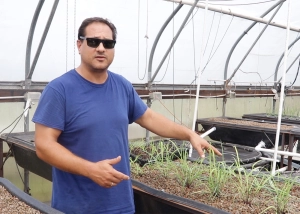
Dr. Nicholas Romano, Extension specialist and interim director of the Center of Excellence in Aquaculture and Fisheries at the University of Arkansas at Pine Bluff (UAPB), has received a $109,000 grant from the U.S. Department of Agriculture Agricultural Research Service (USDA-ARS) to conduct aquaponic research for two years. The project will investigate the use of freshwater aquaponics in the production of high-value fish and plants, including herbs, vegetables, and flowers.
“Last year, three aquaponic studies were conducted at UAPB,” Dr. Romano, said. “However, with this research agreement, I will be able to fund a doctoral apprenticeship and research assistant for aquaponic research. This should greatly improve our productivity and train more people in this important field.”
Dr. Romano said aquaponics is the combined farming of fish and plants. In an aquaponics system, fish waste provides essential nutrients to the plants.
“In some instances, the growth of plants in aquaponics systems can far exceed those grown traditionally in the soil,” he said. “For example, this is the case in sweet potato slip production. Considering this, aquaponics can revolutionize the production of some plants.”
Currently, leafy greens such as lettuce and herbs are commonly grown using aquaponics. However, lately, there has been a push to diversify products, particularly those that have a higher market value, such as fruits.
“More research is needed to optimize the production of fruit such as strawberries using these systems, he said. “One of the challenges in growing fruit is that flowering is often suppressed due to high nitrate levels in the systems and potential limitations in one or several key micronutrients. Therefore, my research will focus on the micronutrient levels and using several plant species to help keep nitrate levels low.”
Since aquaponic systems can utilize a much smaller physical footprint compared to traditional farming, this method of production may allow people in urban areas to have access to fresh produce that is locally grown, Dr. Carl Webster, a research scientist at the USDA-ARS Harry K. Dupree Stuttgart National Aquaculture Research Center (SNARC), said. This could help alleviate or mitigate food deserts in some areas of the country.
“There has been a long and impactful history of collaborative research between SNARC and UAPB,” Dr. Webster said. “This research should be highly beneficial, not just for aquaculture in Arkansas, but also the nation and the world.”
In addition to conducting research, Dr. Romano travels to various high schools in Arkansas to provide fish for their aquaponic systems and general outreach. He has also set up aquaponic systems at local schools in Pine Bluff to help teach young children about sustainable farming.






